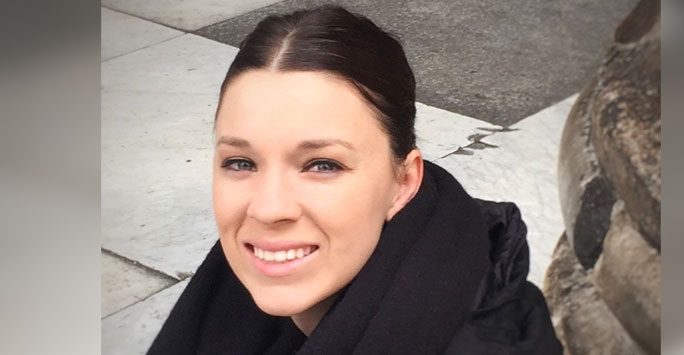
This month, we are pleased to feature Dr Mary Booth as our researcher in focus. Here, Mary tells us all about her research interests and her work as Programme Manager for the Centre for the Study of International Slavery (CSIS).
Listen to Mary talk about her work and research in our researcher in focus podcast below.
History and heritage
The crossover between heritage and history is a fascinating and challenging field of study, both academically and personally. Heritage works to bring historical topics to life for contemporary audiences - placing the trauma, resistance, joy, and pain of the past to those affecting change in the present.
I have dedicated my academic career to the study of interpretation and memorialization techniques surrounding the representation of historical atrocities. I believe that societies willing to openly depict these topics, accurately and with both detail and nuance, are better placed to address the long-lasting legacies of this trauma.
This conviction has led me to complete multiple projects analysing how distinctive socio-historical environments of museological spaces can create a memorial landscape resistant to the incorporation of a complex discourse interpreting historic acts of violence.
My research expands from historic house representation of families and individuals who economically benefitted from the slavery system to discourse surrounding local tragedies including the Easter Rising in both the United Kingdom and Ireland, as well as the extensive interpretation surrounding the Holocaust on a global scale.
The distinct representational techniques employed when articulating historic atrocities often provide a clearer understanding of contemporary ideologies and social movements.
Legacies of Slavery and Colonialism at UK Universities
I am passionate about the continued research into the ‘founders’ of universities around the country and identifying how benefactors and their familial links connect to the Trans-Atlantic Slave Trade, the Caribbean plantation system, and mercantile firms involved in the trade of commodities produced by enslaved populations.
I have led on key stages in the ongoing programmes for the University of Manchester and Liverpool as both institutions identify and articulate this history in an ongoing effort to reckon with the university’s past and expand efforts of reparative justice. I hope to encourage and empower future generations interested in this field of study to engage and advance this work.
Co-Production and Parity
As Programme Manager for the Centre for the Study of International Slavery (CSIS), founded as a partnership between the University of Liverpool and National Museums Liverpool, co-production and community engagement has been at the heart of all of our initiatives.
Independently from the centre, I vehemently believe parity in research, practice, and creation is critical when addressing historical topics both through heritage and beyond. I have been lucky enough to collaborate with researchers and activists in the US and UK to contribute to ongoing practical and academic discourse. This includes but is not limited to, participating in the co-curation of museum exhibitions around the country, creating educational initiatives to advance slavery discourse in primary and secondary classrooms, and advancing contemporary knowledge through publications.
Specifically, these publications include ‘The master’s tools will never dismantle the master’s house: From Inequality to Advocacy in the Heritage Sector’ with Lois South, Liverpool activist and Community Engagement Manager and Educator at International Slavery Museum (currently in progress) and ‘Reputable and Entitled to Credit: The Respectability of African American Women in Nineteenth-Century New York City,’ published by Cornell University Press in 2019 with American scholar Dr Jane Dabel.
The crossover between history and heritage is often a contested terrain, but through parity, collaboration and co-production, this practice has the power to connect individuals, communities and societies around the globe.